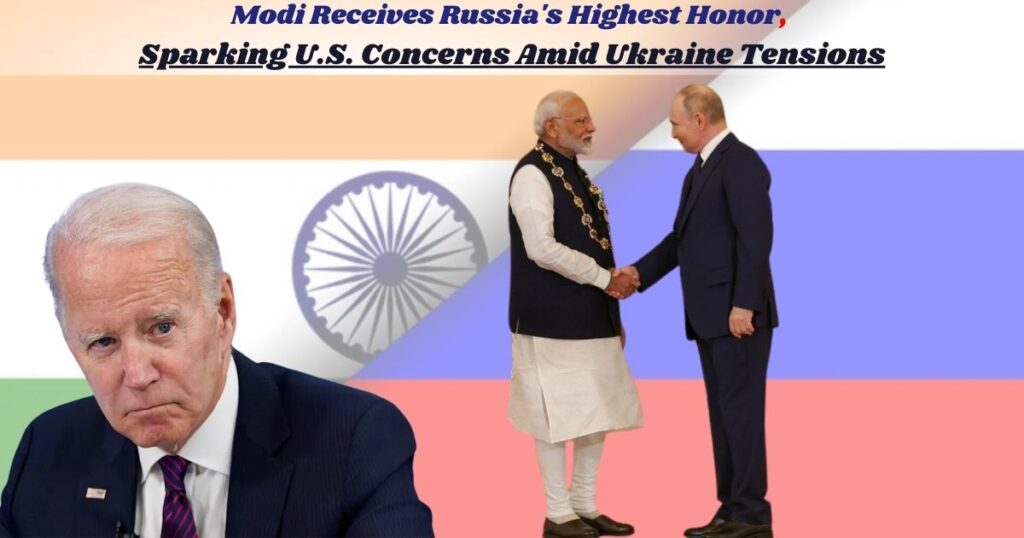In a significant diplomatic event, Modi receives Russia’s highest honor, the St. Andrew’s Order, from Russian President Vladimir Putin. This prestigious award, often compared to the United States, “The Presidential Medal of Freedom”, is a testament to the strengthening ties between India and Russia. The honor, announced in 2019, was finally presented in 2023, marking a historic moment in India-Russia relations.
U.S. Concerns Over India-Russia Relations
The U.S. has been vocal about its concerns regarding the close ties between India and Russia, particularly in light of the ongoing conflict in Ukraine. A U.S. government spokesperson emphasized that Washington has made it clear to New Delhi its concerns about India’s engagement with Russia. The U.S. hopes that India, along with other nations, will uphold the principles of the UN Charter, especially regarding territorial integrity and sovereignty.
The U.S. stance is grounded in its broader geopolitical strategy and its response to Russia’s actions in Ukraine. The Biden administration has consistently pushed for international condemnation of Russia’s invasion of Ukraine, urging allies and partners to distance themselves from Moscow. The U.S. sees India’s engagement with Russia as potentially undermining this global diplomatic effort.
Ukraine’s President Zelensky’s Reaction
Ukrainian President Volodymyr Zelensky has been particularly critical of Modi’s visit to Russia. Zelensky expressed disappointment, referring to Putin as “the world’s bloodiest criminal” and criticizing the Indian Prime Minister for engaging with him. This reaction came amidst a series of Russian missile attacks on Ukraine, which included strikes on a children’s hospital in Kyiv, causing significant civilian casualties and sparking international outrage.
Modi, while in Russia, addressed these concerns directly in his discussions with Putin. Modi’s public statement highlighted the human cost of the conflict, particularly the suffering of children, and reiterated India’s historical stance on resolving disputes through peaceful means. Modi’s call for peace and his critique of the violence in Ukraine was significant, given the context and the presence of President Putin.
Vladimir Putin’s Response
Putin’s response to Modi’s remarks was measured. He acknowledged the discussions on Ukraine and appreciated India’s perspective, emphasizing the longstanding peaceful approach advocated by India. Putin’s willingness to entertain Modi’s critique without showing signs of tension underscores the diplomatic balancing act both leaders are engaging in.
Implications for U.S.-India Relations
Modi’s visit to Russia and his receipt of the St. Andrew’s Order have significant implications for U.S.-India relations. The U.S. views India as a critical partner in the Indo-Pacific region and a counterbalance to China’s growing influence. However, India’s close ties with Russia complicate this strategic partnership. Washington is likely to continue to press India on its relations with Moscow, especially regarding arms purchases and energy deals.
Benefits for India and Russia
For India, the relationship with Russia offers several strategic advantages. Russia is a major supplier of military equipment to India, and the two countries are deepening their cooperation in areas such as nuclear energy. Russia plans to build six additional nuclear power plants in India, which could significantly reduce India’s energy costs. Modi’s visit also included discussions on floating nuclear power plants, highlighting the potential for innovative energy solutions.
For Russia, maintaining strong ties with India helps counterbalance international isolation resulting from the Ukraine conflict. India’s neutral stance on the conflict and its engagement with Russia provide Moscow with a valuable diplomatic ally.
Conclusion
The awarding of the St. Andrew’s Order to Prime Minister Modi by President Putin is a landmark event in India-Russia relations. However, it also brings to the forefront the complexities of global diplomacy, particularly with the U.S. and its allies watching closely. The U.S. is concerned about the implications of India’s engagement with Russia, especially in the context of the Ukraine conflict.
Questions for Readers
- What do you think about India maintaining strong relations with Russia despite global tensions?
- How do you see the U.S. balancing its strategic partnership with India against its stance on Russia?
- What impact do you think Modi’s receipt of the St. Andrew’s Order will have on India’s international relations?
Feel free to share your thoughts and comments below. Your perspectives are valuable in understanding the broader implications of these developments.

